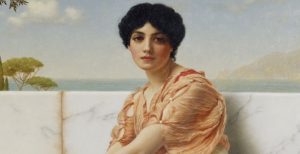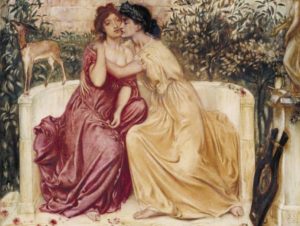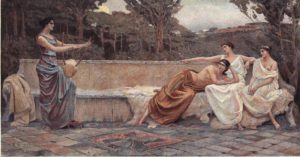As pride month is coming to an end, it is important to commemorate people from all around the world who have shaped the LGBT+ community to what it is today; with one of them being a poet from Ancient Greece, Sappho.

Sappho is an Archaic Greek poet from the island of Lesbos, a little island in the Mediterranean close to today’s Turkey. Very little is known about Sappho’s life due to most of her work being missing. She was, however, the most important female lyricist of the classical age, and is known for her lyric poetry, written to be sung while accompanied by a lyre, which was a common instrument in Antiquity. Coming from a rather wealthy aristocratic family with three brothers, she had learned to play the lyre in her youth. Her brothers are mentioned in different poems while we don’t come across any descriptions of her parents. She was exiled to Sicily around 600 BC with her family because of political conflicts.
“Although only breath, words which I command are immortal”
No reliable portrait of Sappho’s physical appearance has survived. On the other hand, in her poem Tithonus, she had described her hair as being black during her youth. She was described as “beautiful” among other things by Plato, and we know she commanded a lot of attention. Even so, it wasn’t her beauty that made her famous, but her poems. Her works included religious hymns, wedding songs and love songs, collected in nine books. She had a clear use of language and an incredible expressive power. She even developed a new lyrical metre called Sapphic Stanza, and her poetry served as an inspiration for other poets.
Plato went as far as describing her as “The tenth Muse”, one of the goddesses in Greek mythology who presides over the arts and sciences, and “The Poetess”. She had statues built in her honor, was one of the few women to be pictured on pottery, and was highly prized and esteemed. According to Friedrich Schlegel, a German poet who lived between 1772-1829, if we had the complete works of Sappho, it is quite possible that we would never recall Homer.

“My skin was once supple and smooth, but now it is withered by age; my hair had been lustrous and black, but now it is faded and gray.”
It is believed that Sappho primarily wrote love poetry, specifically love towards women. Sappho’s sexuality was not clear, but many called her a “women-lover”. This, however, did not stop her poetry from getting cherished by Ancient greeks. In fact, homosexual feelings were seen as perfectly normal. Nonetheless, men and women were still expected to get married. Some scholars believe that her poems could have been made to read out loud to an audience full of men, or that she was writing from a men’s point of view. One of her best-known poems is spoken by someone looking at a beautiful girl, and envying the man talking to her. Translators have assumed that the person talking must be a man, with that said there is a big hint that it isn’t: Sappho has used the adjective “chlorotera,” translated as “green,” to describe the speaker in the form you would use if it were a woman speaking. This shows that Sappho indeed wrote about homosexual feelings towards women. She also wrote about other topics – her poetry explores individual identity and personal emotions such as desire, jealousy, and love. Today, only 200 fragments out of an estimated 700 of Sappho’s poems remain, and only four poems have been reconstructed to this day.
“And Eros has given me beauty not found in the light of the sun: the passion and patience for life that so often is lost on the young.”
In later Greek history, her poetry was frowned upon and then banned by the early church. Expressing sensations with the passion and commitment of Sappho was seen as immoral. One theologian went as far as describing her as a “sex-hungry whore, singing about her own sluttishness.” Many legends and rumors were created to hide Sappho’s “immoral” feelings, with the most popular one being the one about her unrequited love for a ferryman. The legend states that due to the grief she felt from this one-sided love, Sappho has jumped off a cliff – yet we know this isn’t true. Sappho was much older when she died seeing as she complains about her greying hair and creaky knees in one of her poems.

“Come to me now thus, Goddess, and release me
From distress and pain; and all my distracted
The heart would seek, do thou, once again fulfilling,
Still, be my ally!”
Whatever Sappho’s sexuality may be, it is thanks to her and her home island that we have the terms “lesbian” and “sapphic.” While Sappho has not used those terms, today they are used to describe romantic feelings for women or women aligned people by other women or women-aligned people. It was in 17th century France that these labels turned up for the first time, and were added to the dictionary in mid 19th century.
In 2008, some of the inhabitants of the island instituted proceedings against Greece’s homosexual community and wanted to prevent them from using the term “lesbian” in their name, saying that the inhabitants of the island were the only permissible “lesbians” and the sense of the word had nothing to do with sexual orientation. The proceedings were later dropped. Funny, right?

